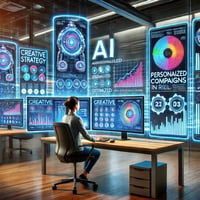Artificial intelligence (AI) is no longer a futuristic concept, but a powerful tool transforming...
How AI is Transforming Marketing Automation
As a seasoned digital marketing expert, I've seen the rapid evolution of marketing technologies, and none has had a more significant impact than automation. Automation has empowered marketers to streamline repetitive tasks, optimize processes, and reclaim time for more strategic and creative work. However, just like any other technology, automation has its limitations—this is where artificial intelligence (AI) steps in, poised to revolutionize marketing automation as we know it.
The Power of AI in Personalization at Scale
 One of the most exciting areas where AI is making a difference is in the realm of personalization. Traditional marketing automation allowed us to send out segmented emails and targeted ads based on demographic factors like age, gender, or location. But AI takes this a step further by enabling hyper-personalization, a concept that goes beyond basic segmentation.
One of the most exciting areas where AI is making a difference is in the realm of personalization. Traditional marketing automation allowed us to send out segmented emails and targeted ads based on demographic factors like age, gender, or location. But AI takes this a step further by enabling hyper-personalization, a concept that goes beyond basic segmentation.
AI can analyze vast amounts of customer data in real time—everything from browsing behavior, past purchases, to social media interactions. This allows marketers to craft messaging that is not only relevant but deeply personal. For instance, with the help of AI-driven tools, a retailer could send a personalized email to a customer that considers their past interactions, preferences, and even emotional sentiment.
Real-world example: According to a study by Epsilon, 80% of consumers are more likely to make a purchase when brands offer personalized experiences, this level of engagement can be achieved at scale, allowing businesses to create personalized touchpoints throughout the customer journey, resulting in higher conversion rates and customer loyalty.
AI-Driven Campaign Optimization
AI doesn’t just stop at personalization—it also enhances the way marketing campaigns are managed and optimized. Traditionally, campaign optimization required manual adjustments to budgets, targeting, and messaging. However, with AI, these adjustments can be done automatically and in real time.
Imagine running a multi-channel marketing campaign. AI-powered tools can analyze the performance of each channel (email, social media, PPC, etc.) and redistribute resources based on what’s performing best. Whether it’s adjusting budgets, refining audience targeting, or tweaking messaging, AI ensures campaigns are always performing at their best without the need for constant manual intervention.
Example of AI in action: Tools like Google Ads Smart Bidding and Facebook’s Campaign Budget Optimization (CBO) leverage AI to optimize ad performance by learning from real-time data and audience behavior . This cient use of marketing budgets and improved ROI.
Automating Tedious Tasks with AI
 Aside from campaign optimization, AI excels at automating routine and time-consuming tasks, such as data entry, lead scoring, and even content creation. Traditionally, these tasks have been labor-intensive, leaving little room for creative ideation or strategic thinking. AI can now take on many of these tasks, allowing marketers to focus on high-value activities.
Aside from campaign optimization, AI excels at automating routine and time-consuming tasks, such as data entry, lead scoring, and even content creation. Traditionally, these tasks have been labor-intensive, leaving little room for creative ideation or strategic thinking. AI can now take on many of these tasks, allowing marketers to focus on high-value activities.
AI-powered tools such as HubSpot’s Lead Scoring and Salesforce’s Einstein AI can automatically evaluate and prioritize leads based on their potential to convert, allowing sales teams to focus on the most promising opportunities. Moreover, AI content platforms like Copy.ai and Jasper assist brands in creating blog posts, social media content, and email sequences that align with their brand voice and audience preferences..
The Role of AI in Content Creation goes beyond simple automation. It can develop content driven by data insights, making it a crucial asset for content marketers. Utilizing natural language processing (NLP), AI tools can generate high-quality, SEO-friendly articles that align with a brand's voice and messaging. For example, AI tools can examine successful blog posts and create new content that reflects their structure and tone, yet is customized for specific audience segments.
Example: Tools such as Frase and SurferSEO assist marketers in simplifying content creation by producing content briefs, keyword strategies, and complete articles based on competitive research and audience insights. This degree of automation not only conserves time but also helps produce content that connects with the audience and enhances traffic more efficiently.
The Human Element in the Age of AI
The fear that AI will replace marketers is a common misconception. AI is here to augment our capabilities, not replace us. While AI can handle repetitive tasks and analyze data faster than any human, it lacks the emotional intelligence, creativity, and strategic thinking that only humans can bring to the table.
In the future of marketing automation, AI will handle the heavy lifting—data analysis, personalization, and optimization—while marketers will focus on higher-level tasks like strategy development, creative ideation, and building meaningful customer relationships.
Key takeaway: As McKinsey highlights, the future of AI in marketing is not about eliminating jobs but transforming roles. AI enables marketers to concentrate on activities that truly add value, such as innovating customer experiences and developing long-term brand strategies .
References:
- Epsilon, "The Power of Personalization in Customer Experience."
- Google Ads Smart Bidding, "How Machine Learning is Shaping Ad Optimization."
- Facebook Campaign Budget Optimization, "Maximizing ROI Through Automated Budgeting."
- HubSpot Lead Scoring, "AI and Predictive Lead Scoring for Better Sales."
- Copy.ai, "How AI is Changing Content Creation for Businesses."
- Jasper, "Content Creation in the Age of AI."
- Frase, "Streamlining Content Strategy with AI."
- SurferSEO, "AI-Driven Content Optimization for Higher Search Rankings."
- McKinsey & Company, "The Impact of AI on Future Work in Marketing."





